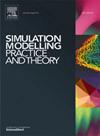Simulation modeling of super-large ships traffic: Insights from Ningbo-Zhoushan Port for coastal port management
IF 3.5
2区 计算机科学
Q2 COMPUTER SCIENCE, INTERDISCIPLINARY APPLICATIONS
引用次数: 0
Abstract
With the expansion of coastal ports, the number of super-large berths is on the rise. It has become imperative to accurately assess the operational impact of these berths, optimize berth utilization, and minimize ship delays. In this study, a detailed simulation model of super-large ship arrivals and departures was developed, focusing on the Ningbo-Zhoushan Port. The model accounts for various special navigation constraints, including berthing and departure time windows, safety separations, tidal constraints, and interference from neighboring berths. The simulation results highlight a significant disparity in waiting times between arriving and departing ships, with daytime restrictions and berth time windows emerging as the primary factors influencing wait times. Consequently, several improvement measures are proposed. These include implementing priority rules based on time windows, establishing additional inner anchorages, and reducing safety separations. Among these, reducing safety separations offers the best cost-effectiveness due to its low application cost and effective results. Although these measures may lead to varying waiting times among berths, they collectively contribute to a substantial 25.6% reduction in overall waiting time. This study offers valuable insights and practical guidance for the planning, construction, and operation of super-large berths in coastal ports.
超大型船舶交通仿真建模:宁波-舟山港对沿海港口管理的启示
随着沿海港口的扩大,超大型泊位的数量也在不断增加。准确评估这些泊位的运营影响、优化泊位利用率并最大限度地减少船舶延误已成为当务之急。本研究以宁波-舟山港为中心,建立了详细的超大型船舶进出港模拟模型。该模型考虑了各种特殊的航行限制,包括靠离泊时间窗、安全间隔、潮汐限制以及邻近泊位的干扰。模拟结果表明,到港船舶和离港船舶的等待时间存在明显差异,其中白天限制和泊位时间窗口是影响等待时间的主要因素。因此,提出了几项改进措施。这些措施包括实施基于时间窗口的优先规则、增设内部锚地以及减少安全间隔。其中,减少安全间隔因其应用成本低、效果好而具有最佳的成本效益。尽管这些措施可能会导致不同泊位的等候时间不同,但总体而言,这些措施可使总体等候时间大幅减少 25.6%。这项研究为沿海港口超大型泊位的规划、建设和运营提供了宝贵的见解和实际指导。
本文章由计算机程序翻译,如有差异,请以英文原文为准。
求助全文
约1分钟内获得全文
求助全文
来源期刊

Simulation Modelling Practice and Theory
工程技术-计算机:跨学科应用
CiteScore
9.80
自引率
4.80%
发文量
142
审稿时长
21 days
期刊介绍:
The journal Simulation Modelling Practice and Theory provides a forum for original, high-quality papers dealing with any aspect of systems simulation and modelling.
The journal aims at being a reference and a powerful tool to all those professionally active and/or interested in the methods and applications of simulation. Submitted papers will be peer reviewed and must significantly contribute to modelling and simulation in general or use modelling and simulation in application areas.
Paper submission is solicited on:
• theoretical aspects of modelling and simulation including formal modelling, model-checking, random number generators, sensitivity analysis, variance reduction techniques, experimental design, meta-modelling, methods and algorithms for validation and verification, selection and comparison procedures etc.;
• methodology and application of modelling and simulation in any area, including computer systems, networks, real-time and embedded systems, mobile and intelligent agents, manufacturing and transportation systems, management, engineering, biomedical engineering, economics, ecology and environment, education, transaction handling, etc.;
• simulation languages and environments including those, specific to distributed computing, grid computing, high performance computers or computer networks, etc.;
• distributed and real-time simulation, simulation interoperability;
• tools for high performance computing simulation, including dedicated architectures and parallel computing.
 求助内容:
求助内容: 应助结果提醒方式:
应助结果提醒方式:


